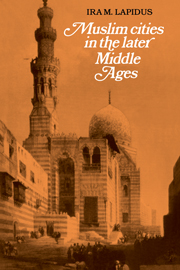Book contents
- Frontmatter
- Contents
- PREFACE
- INTRODUCTION
- CHAPTER I A HISTORY OF CITIES IN THE MAMLUK EMPIRE
- CHAPTER II THE MAMLUK REGIME IN THE LIFE OF THE CITIES
- CHAPTER III THE URBAN SOCIETY
- CHAPTER IV THE POLITICAL SYSTEM: THE MAMLUK STATE AND THE URBAN NOTABLES
- CHAPTER V THE POLITICAL SYSTEM: THE COMMON PEOPLE BETWEEN VIOLENCE AND IMPOTENCE
- CHAPTER VI CONCLUSION: SOCIETY AND POLITY IN MEDIEVAL MUSLIM CITIES
- BIBLIOGRAPHICAL NOTES
- INDEX
CHAPTER IV - THE POLITICAL SYSTEM: THE MAMLUK STATE AND THE URBAN NOTABLES
Published online by Cambridge University Press: 24 November 2009
- Frontmatter
- Contents
- PREFACE
- INTRODUCTION
- CHAPTER I A HISTORY OF CITIES IN THE MAMLUK EMPIRE
- CHAPTER II THE MAMLUK REGIME IN THE LIFE OF THE CITIES
- CHAPTER III THE URBAN SOCIETY
- CHAPTER IV THE POLITICAL SYSTEM: THE MAMLUK STATE AND THE URBAN NOTABLES
- CHAPTER V THE POLITICAL SYSTEM: THE COMMON PEOPLE BETWEEN VIOLENCE AND IMPOTENCE
- CHAPTER VI CONCLUSION: SOCIETY AND POLITY IN MEDIEVAL MUSLIM CITIES
- BIBLIOGRAPHICAL NOTES
- INDEX
Summary
The structure of urban society, and the preponderance of the Mamluk regime in the economic and social life of the cities, created the configuration of political actions by which the cities were ruled. Urban societies, dependent as they were on the Mamluk elites for the defense of the cities, food supply, investments in communal institutions, and maintenance of the urban physical infrastructure, operated within the context created by Mamluk behavior. In response to these powers, the notables were drawn into a governing condominium with the Mamluks, a shared control over the society. While the Mamluks took up the massive economic and military responsibilities, the notables lent their intimate grasp of local affairs to the service of the state and coordinated the government of the society at more intricate levels. Their original social importance made them indispensable auxiliaries of the Mamluk state apparatus, and in turn their partial assimilation to the regime served to validate their local status and to assure their success in communal roles. In this chapter we shall discuss the special case of the merchant notables and the politically more crucial relationship of the ulama notability to the Mamluk regime.
Two other components of the civilian notability do not seem to have had a comparable importance in mediating between the regime and the populace. The awlād al-nās, the sons of Mamluks, who might be thought to have an important position of this sort were largely employed in an auxiliary military force, the halqa, created expressly for the purpose of finding a socially and financially suitable employment for the sons of former officers.
- Type
- Chapter
- Information
- Muslim Cities in the Later Middle Ages , pp. 116 - 142Publisher: Cambridge University PressPrint publication year: 1984



